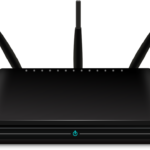Generally, when users connect to the internet, they are first connected to their ISP or Internet Service Provider. The ISP then connects them to the websites they want to visit. This means that their internet traffic first passes through the ISP servers.
However, a VPN router operates differently. With a VPN, you are connected to a private server which is operated by your VPN service provider through a protected/coded connection. This is also termed as the “VPN tunnel”. What does this mean? It implies that the information which travels between your device and your VPN server stays encrypted and only you can see it (besides the VPN server).
VPN and User Anonymity
So the question arises, how does a VPN router safeguard your anonymity?
When using a VPN router, it appears that you’re accessing the internet through the VPN server’s IP address. So if your VPN server is in another country; for the internet, you are also online from that country.
If somebody is keeping a track of your internet activities through the internet would only be successful in tracing them back to your VPN server. This means you are absolutely anonymous on the internet unless your VPN server provides your details and your actual IP address isn’t known to any website that you visit.
Security Protocols as VPNs
There are a number of security protocols which have been designed VPNs. All these protocols offer varying levels of security. The most common security protocols are:
IP security (IPSec): IP security is frequently utilized for securing Internet communications. It is operational in two distinct modes. The Transport mode will only protect the information packet message. On the other hand, the Tunneling mode will safeguard the complete information packet.
Layer 2 Tunneling Protocol (L2TP): The IPSec and L2TP protocols bring together their brilliant individual features and create a dynamically secured VPN client.
Secure Shell (SSH): Secure Shell works to develop the VPN tunnel as well as the encryption required to protect it. This implies that the traffic is routed from the remote fileservers via encrypted channel to transfer the unsecured data of the user.
TLS (Transport Layer Security) and SSL (Secure Sockets Layer): TLS and SSL are used widely for securing service providers and online retailers. A ‘handshake’ method is used for operating these protocols. The handshake generates cryptographic parameters, usually digital certificates that allow both systems to exchange protection keys. This helps in authenticating the session and developing a secure connection.








